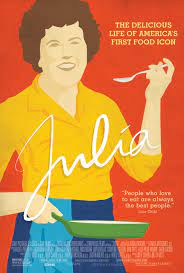
JULIA
US, 2021, 95 minutes, Colour, black and white.
Directed by Julie Cohen, Betsy West.
There have been quite a number of famous people in recent history called Julia. However, the contention of this documentary is that for many Americans, as well as for cooking fans throughout the world, simply naming Julia meant that the reference was to Julia Child. For those who have no idea who Julia Child is, whose realm is not that of the kitchen and cooking, here is an opportunity to get to know her and why she became so famous.
For filmgoers, especially those not adept at cooking, there was the opportunity in 2009 for a cinema introduction to Julia Child where she was played, so strikingly of course, by Meryl Streep in Julie and Julia (even to the impersonation of Julia Child’s idiosyncratic voice).
While there is some background about Julia Child’s earlier life, her presence in France and love for France, her marriage to Paul Child, a very long and devoted marriage, this film takes as its starting point Julia’s love for French cooking, enraptured by it, writing about it, working with a range of French cooks and experts (many of them here being interviewed).
Julia Child was a television personality, one of the original, perhaps the original, chef on television. She did not look like an immediate candidate – she was in her 50s, she was a tall, biggish woman, she had a strangely high-pitched voice and accompanying delivery, she had no previous experience. However, in the 1960s, with the emerging of public television, she was offered a place, found a niche, consolidated that niche with her screen presence, her direct addressing of her public, confiding in them as if we were standing on the other side of the table in the kitchen listening to her, watching her. No re-takes so, if something did not turn out too well, something spilt, it was simply a whoops situation, pick up the mess, carry on.
For those who enjoyed seen Julia Child on television, seeing her at work, admiring her, learning from her, being inspired by her, there is an abundance of clips throughout the film.
But, as with all television personalities (and here she is seen being interviewed by the hosts of the TV night shows, Johnny Carson, David Letterman, Dick Cavitt, Jay Leno…), There comes a time. But, in her 70s, on she went, appearing on Good Morning, America, continuing in the same vein, into the 80s, into the 90s. In fact, she died in 2004 (born in 1912).
Two other aspects emerge from this documentary, her relationship with her husband. A number of those interviewed found Paul Child too enigmatic for their taste and friendship. However, with footage from the past, with many photos, we realise that Paul Child was devoted to Julia, helping her in practical ways, management, encouragement, and stepping back from the limelight. There are some sad moments towards the end with his stroke, debilitated health, dementia.
The other aspect is the role of Julia Child played in the feminism awareness of the second half of the 20th century. She did become involved in some social issues, especially Planned Parenthood (she and Paul were unable to have children themselves), and became targeted at times by Pro-Life campaigners. The other area that the film highlights is that of sexual orientation, Julia being a person of her times and discovering so many gay men in the cooking world, perhaps a bit flippant at first, but with the emergence of AIDS, discovering more compassion, campaigning, cooking festivals in support, stating that preparing food is a wonderful expression of love.
For audiences who, perhaps, prefer to shun the kitchen and cooking, the film is an introduction to quite a character. For those who love cooking programs and chefs, of course…